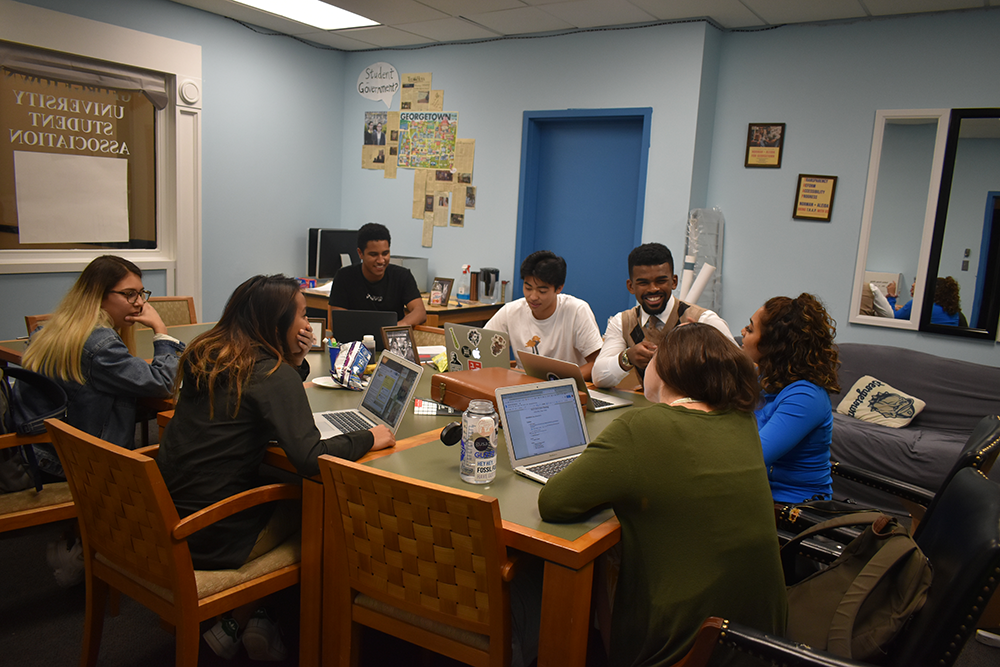The Georgetown University Student Association senate passed a resolution urging Georgetown University to implement paper-free academic practices to improve sustainability and accessibility in an academic setting in a meeting Oct. 27.
The bill, introduced by senate sustainability chair Leo Rassieur (COL ’23), calls for professors to make it possible for students to access all readings and submit all assignments digitally with an option for students to print material, according to the resolution. The resolution permits printing when assignments are too lengthy for the professor to scan or when they are digitally unavailable.
The resolution, which the university is not bound to enact, aims to address inconsistent policies on the use of the learning management platform Canvas across academic departments, according to Rassieur.

“There are some teachers who will do everything online,” Rassieur said. “They’ll use Canvas and email, and you can do the whole class without printing a single piece of paper. But then there are teachers who are the exact opposite, where you can only bring printed materials to class, for example, or you can only submit papers if you print them out.”
The resolution was co-sponsored by senator Zahra Wakilzada (COL ’23) and senator Mikail Husain (COL ’21), as well as two campus environmental sustainability organizations, Georgetown University Fossil Free and the Georgetown Renewable Energy and Environmental Network.
The resolution was created in response to the wasteful accumulation of paper for submitted assignments and readings, according to Husain.
“I thought it was super wasteful that some classes would require paper submissions of assignments, readings or other school related things, especially when so many students would prefer to use electronic versions instead,” Husain wrote in an email to The Hoya.
The resolution also seeks to remedy the financial obstacles created by printing policies, which can be a burden for some students in the cost of printing using university resources, according to GUSA executive sustainability chair Rowlie Flores (COL ’22).
“In my opinion, this is not just a sustainability issue,” Flores wrote in an email to The Hoya. “I don’t think all professors know that printing of class materials is not free and these costs accumulate throughout the semester.”
Forming and passing this resolution attests to the effectiveness of collaborations between sustainability-focused student organizations and GUSA, according to GUFF member and GREEN official liaison Victoria Boatwright (COL ’22).
“It’s always good to pass resolutions like this, but I think that it’s also really important to have a whole network on campus of environmental groups; that’s one thing I found with this resolution that I’d never really seen before,” Boatwright said.
GUSA’s sustainability policy team’s past projects include the Go Plastic-Free initiative, in which GUSA collaborated with the Office of Sustainability to host training sessions for student organization leaders to learn about plastic use reduction.
Although the resolution focuses on creating a standardized, paper-free system, the resolution would maintain a printing option in cases where students are unable to access digital academic material for accessibility or financial reasons, according to Rassier.
“Our goal is to create a more uniform system that would lean much more heavily to the paper-free side of things,” Rassieur said. “There are so many situations where that’s not going to be possible, someone might not have access to an electronic device or for accessibility reasons, they might not be able to use an electronic device.”
Rassieur will meet with the provost’s committee Nov. 6 to discuss potential next steps in implementing paper-free academic practices, he said.
“We hope to continue the negotiating process with the faculty senate and with the Office of the Provost,” Rassieur said. “The resolution is sort of the launching pad for that.”
The resolution’s passage is a step toward implementing paper-free policies across all divisions of the university, and it showcases the demand for environmental accountability within the student body, according to Rassieur.
“This is one part of a really grand scheme to make the university paper-free,” Rassieur said. “The whole reason behind the resolution is that we can show, as students, that we care about sustainability and accessibility in the classroom.”




















